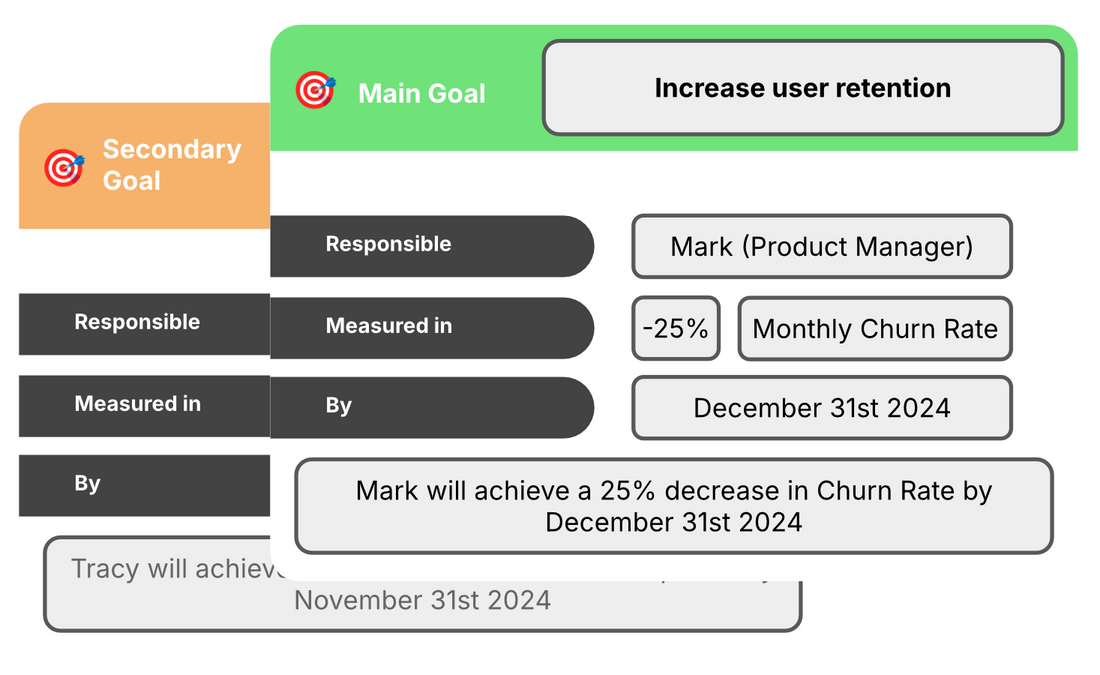
SMART Goals - What are they?
There are many reasons why you might struggle to create a roadmap for you business, product, or team, but the most common one is pretty simple:
- You don't really know what exactly you want to achieve in that given timeframe.
Once you do, coming up with the perfect roadmap is much, much simpler. The key to that are SMART Goals.

What Are SMART Goals?
SMART is an acronym that stands for Specific, Measurable, Achievable, Relevant, and Time-bound. It's a framework designed to make your goals clear and attainable. Here’s a breakdown of what each letter means:
-
Specific: Your goal should be clear and specific. Instead of saying, “I want to grow my business,” say, “I want to increase our social media following by 20%.”
-
Measurable: You need to track your progress. If you set a goal to “improve sales,” it’s better to say, “increase sales by $10,000 in the next three months.” This way, you know exactly how to measure your success.
-
Achievable: Your goal should be realistic and doable. Setting a goal to “become a unicorn startup in a month” is probably too ambitious. Instead, aim for something like “secure three new clients by the end of the quarter.”
-
Relevant: Make sure your goal aligns with your broader business objectives. If your startup is all about tech innovations, a goal like “launch a new app feature” fits perfectly, but “open a new coffee shop” might not.
-
Time-bound: Give your goal a deadline. It’s not enough to say, “I want to improve customer service.” Instead, say, “I want to reduce response times to under 24 hours within the next two months.”
Why Use SMART Goals for Your Startup?
SMART goals make your objectives clear. No more vague “I want to do better” statements. You’ll know exactly what you’re aiming for and how to get there. By breaking down big goals into smaller, manageable parts, SMART goals help you stay focused. It’s easier to tackle a “20% increase in social media followers” than just a general “improve online presence.” Seeing progress is super motivating. With measurable milestones, you can track how well you’re doing and celebrate the wins along the way. SMART goals also help you stay accountable. With specific deadlines and criteria, you’re more likely to stay on track and hit your targets.
How to Set SMART Goals for Your Startup
-
Identify Your Big Goals: Start by thinking about what you want to achieve in your business. Maybe it’s increasing revenue, launching a new product, or expanding your team.
-
Break Them Down: Once you have your big goals, break them down into smaller, SMART goals. For instance, if your big goal is to increase revenue, a SMART goal could be, “Increase monthly revenue by 15% in the next six months.”
-
Create a Plan: Outline the steps you need to take to achieve each SMART goal. This might include setting up marketing campaigns, improving your website, or reaching out to potential clients.
-
Track Progress: Use tools like spreadsheets, project management apps, or even a simple checklist to keep track of your progress. Regularly check in to see how you’re doing and make adjustments if needed.
-
Adjust as Needed: If you find that a goal is too easy or too hard, adjust it. The idea is to keep your goals challenging but achievable.
With SuperFastRoadmap you'll be able to set these up without needing to learn absolutely anything about this framework. Give it a try.